-

When Tropical Cyclone Freddy slammed into Madagascar, Mozambique and Malawi, 32,000 pregnant women were due to give birth within the coming weeks.
The destruction of homes, health facilities and travel routes during the cyclone – which continued for weeks in February and March – made childbirth much more perilous.
Around 5,000 of the women could expect to experience complications in their final months of pregnancy or during childbirth, which, without access to skilled care, could prove fatal.
A climate crisis is an obstetric emergency.
[Pictured above] A young woman and child walk past damaged houses in the Chilobwe township of Blantyre, Malawi, after Tropical Cyclone Freddy hit. © UNFPA Malawi/Eldson Chagara
-
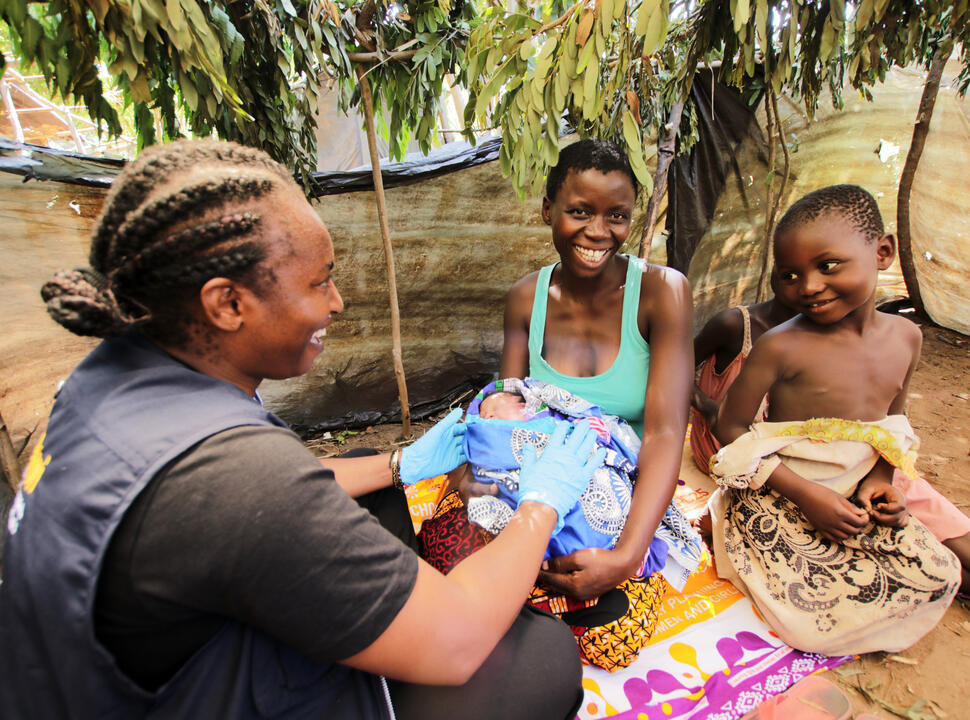
Eliza, 30, was nine months pregnant when the cyclone battered the city of Nsanje in Malawi, the country hardest hit by the storm.
“At first, it started as mere drizzle, but suddenly the intensity grew and it started pouring down in sheets,” she recalls. “I heard a huge thud from outside and immediately knew that part of the wall had collapsed.”
Eliza and her family left home and sought shelter at a makeshift camp, which had no running water. There, she went into labour.
Fortunately, despite disruptions to travel and services, an ambulance managed to make its way to her. “I arrived at the hospital around 10 p.m. At around 2 a.m., I gave birth to a baby girl,” says Eliza, now a mother of four.
[Pictured above] Eliza's newborn receives a checkup from Fainess Yobe, a UNFPA technical officer and a trained midwife and nurse. © UNFPA Malawi/Eldson Chagara
-
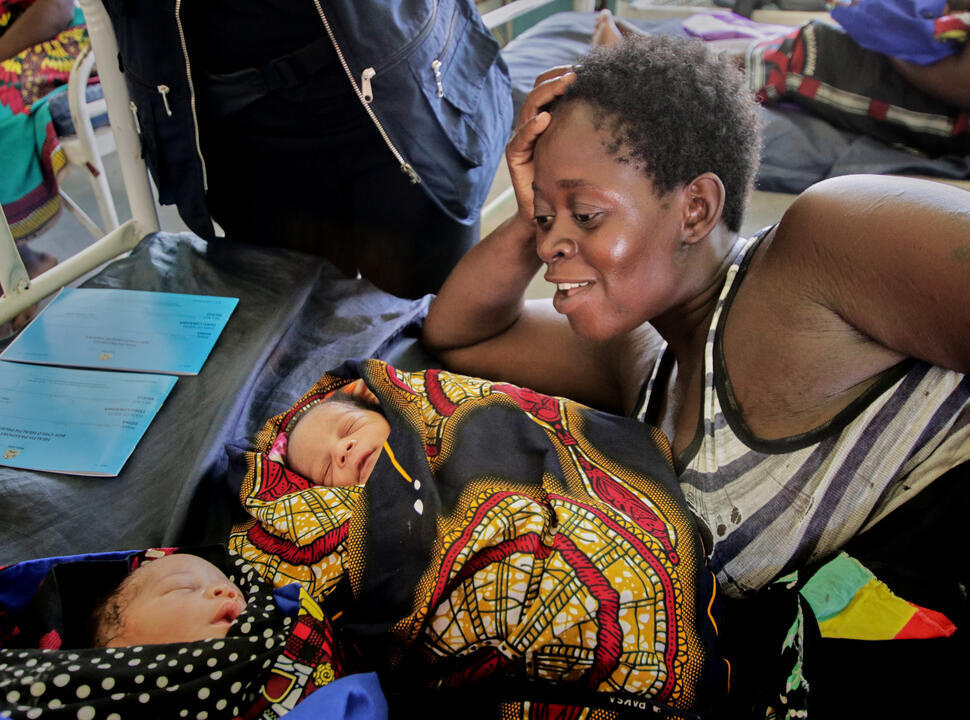
After a two-hour ambulance journey, Mercy, 37, gave birth to healthy twin boys, also in the city of Nsanje.
Mercy had been planning to deliver at her nearest health centre in Ndamera, but the electricity supply had been cut off by the storm.
“It was exciting and a bit scary at the same time,” she says, describing how it felt to learn she was having twins. “I am so grateful that I had a safe delivery. I don’t know what could have happened if the ambulance didn’t come in time.”
[Pictured above] Mercy at the maternity ward with her twin boys. © UNFPA Malawi/Eldson Chagara
-

Thanks to recent repairs of four ambulances, both Eliza and Mercy were able to make it to the hospital to deliver.
The repairs were supported by UNFPA in order to meet an increase in demand in the wake of the storm.
A staggering 87 health facilities were damaged in Malawi during the cyclone. The closure of local clinics means more emergency journeys.
[Pictured above] UNFPA supported the repair of four ambulances in southern Malawi. © UNFPA Malawi/Eldson Chagara
-

In the Zambezia province of Mozambique, where many local facilities have been damaged or destroyed, UNFPA installed temporary health facilities in six tents, including maternity wards.
Here, staff members are dealing with a triple crisis for thousands of pregnant women – cyclone, flood, and a cholera outbreak, which increases the risk of stillbirth.
“Managing cholera cases in pregnancy is very difficult because you need to prevent and treat both cholera and obstetric complications,” says Dr. Marilena Urso, a UNFPA maternal health specialist. “Time is of the essence, as healthcare providers must immediately intervene while monitoring fetal well-being and preventing the spread of cholera itself.”
[Pictured above] UNFPA tents being erected in Zambezia following storm damage. © UNFPA Mozambique/Helder Xavier
-
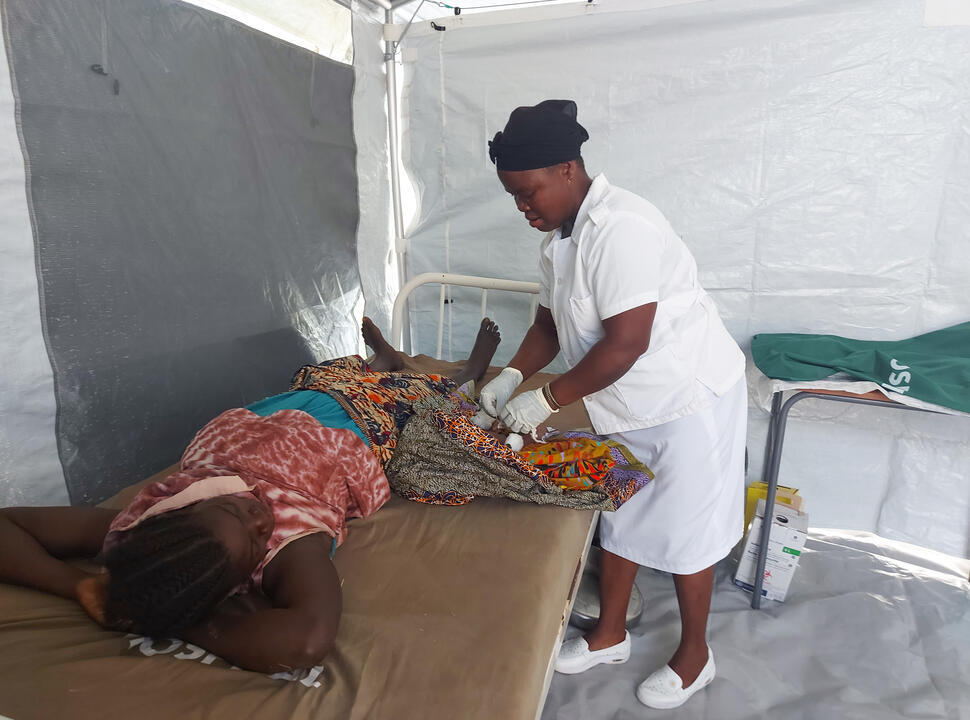
The first patients to be treated inside the new tents were Diana, 23, and her newborn baby.
Diana had given birth at home, but the following day the UNFPA tents opened, allowing her and her newborn son to receive postnatal care from skilled workers.
“Fortunately, mother and baby are in good health,” says nurse Lica Estevão, who provided assistance.
[Pictured above] Diana and her baby received postnatal care at a medical centre temporarily operating out of a tent. © UNFPA Mozambique/Helder Xavier
-
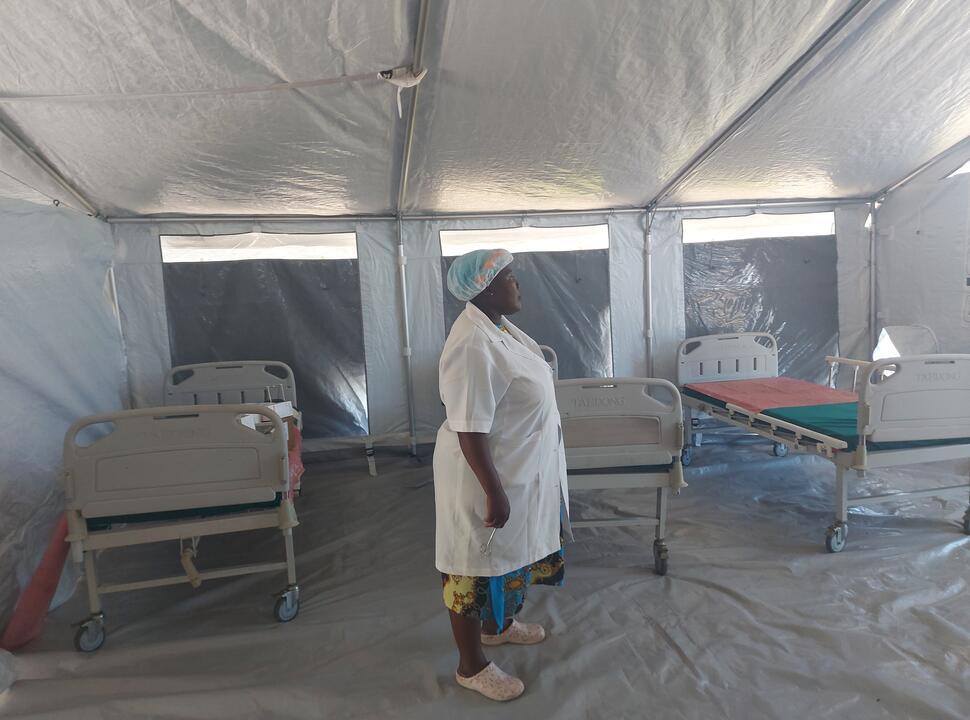
Rosana Henriques, a nurse in the city of Quelimane in Zambezia, describes the new tents as a “breath of fresh air.”
She explains that previously, there was a lack of privacy, as the storm damage had forced her team to work out of a single room in their facility. In the tent where she now works, there is a separate room for the maternity ward, giving people some space.\
[Pictured above] Rosana stands in a newly erected tent where women can give birth with the support of skilled staff. © UNFPA Mozambique/Helder Xavier
-
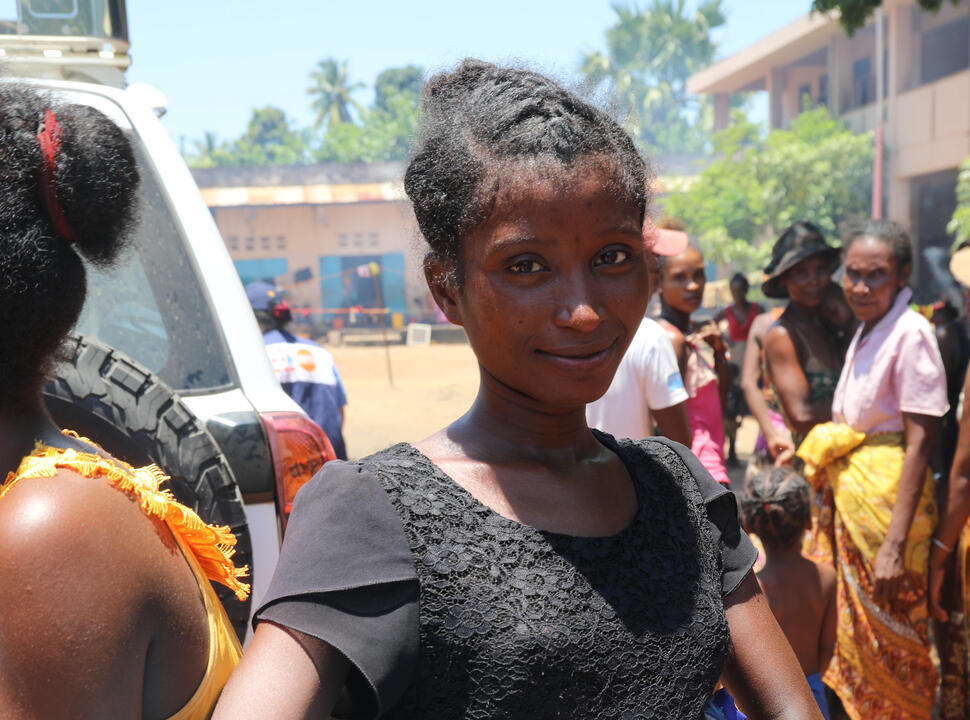
When Cyclone Freddy arrived in Madagascar, the country was busy recovering from another devastating storm – Cyclone Cheneso – which had hit a month earlier, in January.
Sadify, 18, was eight months pregnant when the first cyclone hit.
“The rain fell for more than a week,” recalls Sadify, who received UNFPA support at a temporary site after being forced to leave home amid the crisis.
[Pictured above] Sadify received UNFPA support following Cyclone Cheneso. © UNFPA Madagascar/ Hanta Andremanisa
-

Part of UNFPA’s initial emergency response involves providing dignity and childbirth kits that include health and hygiene supplies to meet the most immediate of needs.
Sadify was unable to pack many belongings when she left her home after Cyclone Cheneso. “This kit that I just received will help us bounce back and better prepare for the arrival of our baby,” she says.
Dignity kits contain hygiene and washing items, a flashlight, a towel and a basin, while childbirth kits contain a plastic bag for the placenta, an umbilical cord tie, gauze tissue, a pair of disposable examination gloves and a razor blade and supplies for midwives.
[Pictured above] Dignity kits help meet the immediate needs of women and girls following a crisis. © UNFPA Madagascar/ Hanta Andremanisa
-

November to April is considered the cyclone season for East and Southern Africa – but cyclones are just one element of the region’s significant climate challenges.
The drought in Madagascar’s Grand Sud region, considered the worst in 40 years, has been going on since 2018. More than 70 per cent of the country’s land is used for agriculture, and cyclones, floods and drought have all caused food shortages.
Whether there’s too much water or not enough, there is an impact on women and girls’ sexual and reproductive health and rights – and their safety. During a crisis, incidences of gender-based violence increase, while at the same time, access to essential services is impeded. UNFPA works to close this gap and to provide support and safe spaces for women and girls.
[Pictured above] The drought in Madagascar’s Grand Sud region has been going on since 2018. © UNFPA Madagascar/Melvis Kimbi
-

Amid a crisis, it’s also crucial that family planning services remain accessible so that women are in control of their reproductive decisions.
For Pela Judith, 25, being able to choose not to have more children is one way to cope with the climate crisis in Madagascar.
“The droughts have changed many things. Now everything has become expensive,” she says. “I am not even able to feed my four children, so giving birth to another child is not in my plans anymore.”
[Pictured above] Pela Judith explains how the Grand Sud drought has changed her family planning decisions. © UNFPA Madagascar/ Hanta Andremanisa
-
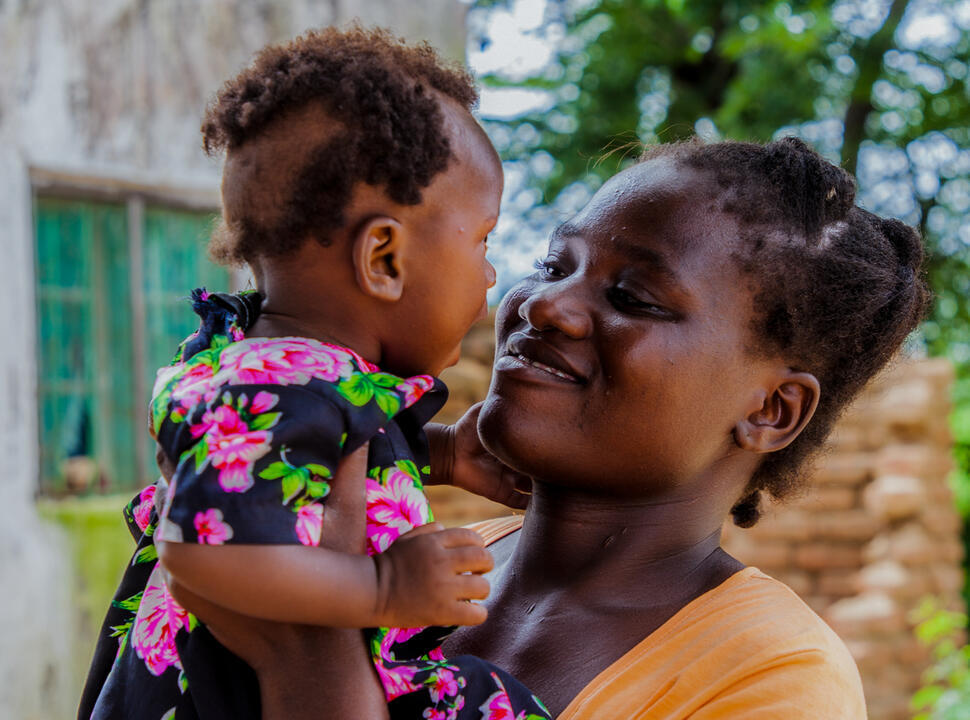
After being uprooted by Cyclone Ana in 2022 in Malawi, Monica, who was six months pregnant with daughter Rehana at the time, is also using family planning services amid the crisis.
“We made the hard decision to abandon our land, which was owned by the family for generations,” she says. “The Cyclone Ana experience was a close shave with death, and we knew that next time, we wouldn’t be that lucky if we didn’t move.”
Monica accessed pre- and post-natal and sexual and reproductive health services supported by UNFPA. She opted for a contraception method that helps her plan her life around the crisis: “I got a five-year family planning method. This will allow us to raise our three children well and also to rebuild our lives.”
[Pictured above] Monica with daughter Rehana in the village of Jambo in Bangula, Malawi. © UNFPA Malawi/Eldson Chagara
-
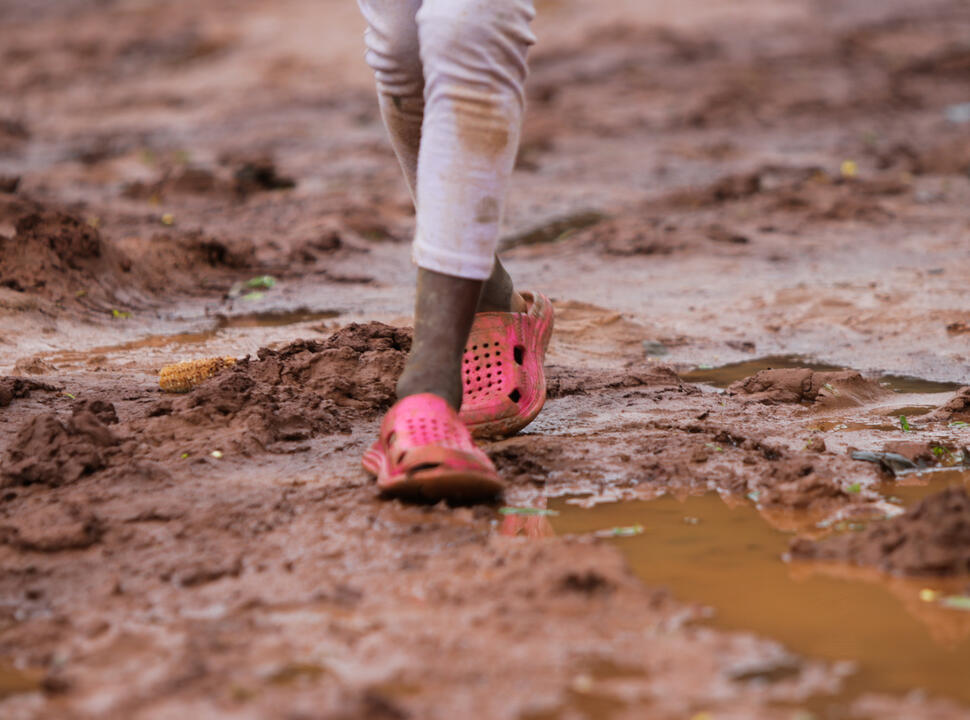
UNFPA and its partners aim to provide sustained support for women and girls throughout a crisis.
We are also working toward long-term change, so that women and young people – those most affected by the climate crisis – can design solutions, and essential health services can continue to provide life-saving care.
[Pictured above] A young girl walks on waterlogged ground at a temporary camp following Cyclone Freddy in Blantyre, Malawi. © UNFPA Malawi/Eldson Chagara
- Home
- Slideshows
- Giving birth during a tropical cyclone
Giving birth during a tropical cyclone
01 May 2023




